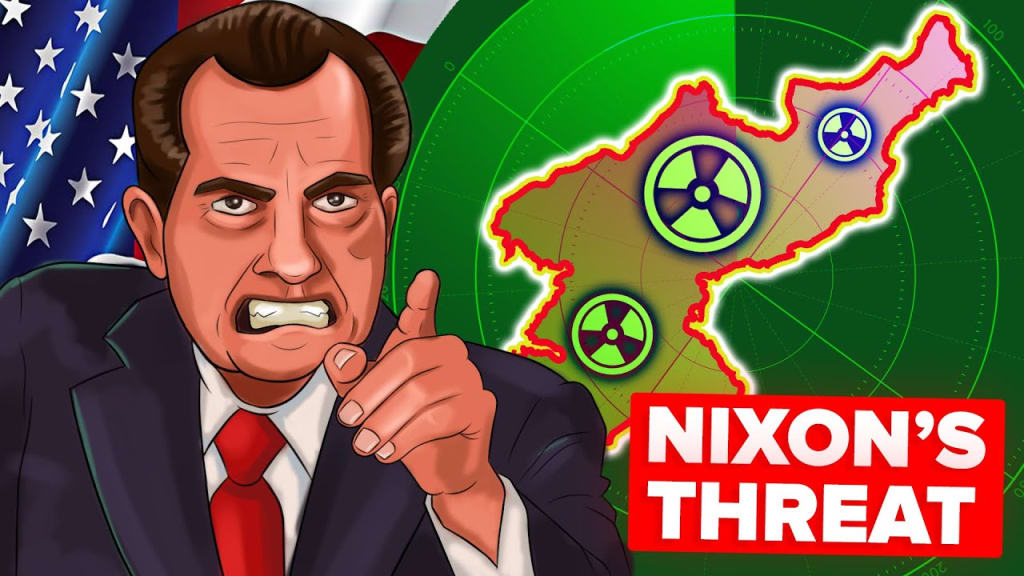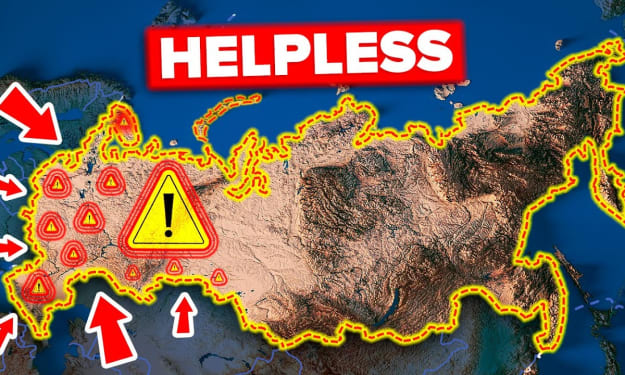When did Richard Nixon try to blow up North Korea?
Nothing scares me more than an irate president making nuclear threats when his finger is on the nuclear trigger! No, we're not talking about Putin; instead, we're looking at a moment when President Nixon nearly nuked North Korea! Don't miss out on this amazing real story that demonstrates that history does repeat itself. ☢🤬💣☢

Nothing scares me more than an irate president making nuclear threats when his finger is on the nuclear trigger! No, we're not talking about Putin; instead, we're looking at a moment when President Nixon nearly nuked North Korea! Don't miss out on this amazing real story that demonstrates that history does repeat itself. ☢🤬💣☢
With a recently opened bottle of Chateau Lafite Rothschild in his hand, President Richard Milhous Nixon, aka Tricky Dick, is enraged as he stumbles over the lip of a rug while making his way through his office. He pours himself a drink and calls his Joint Chiefs of Staff. He growls, "We've got to nuke then Bomb the BLEEP out of them," as soon as he passes through. Moreover, this is not a work of fiction that the Infographics Show has concocted, dear readers. Nixon may not have used the exact words, but while he was inebriated, he did order a nuclear attack against North Korea. You'd be surprised at how frequently Nixon called, claiming that a nuclear strike was required because there was no time to waste. Before we get to Nixon almost launching hell on our Korean brothers, we think we should first give you some background information on the USA, its enemies, and how close they were to being nuked, as Henry Kissinger, Nixon's National Security Advisor, once said about him: If the president had his way, there would be a nuclear war every week.
As you are aware, discussions about nuclear weapons are once again in style. In the fall of 2022, reports in the US media claimed that national security adviser to President Joe Biden had just issued a warning to Russia about the dire consequences of using nuclear weapons. While eating your cornflakes in the morning, you don't want to hear that kind of thing. Oh God, not this again, most people who have been around for a while likely thought. Before moving on, we should make clear something that may have been confusing for some of you. It's likely that you've heard people discuss tactical and strategic nuclear weapons. Despite the fact that the distinction is not always clear-cut, there is a difference. Simply put, tactical nukes are more compact.
They'll probably be employed for close-range assaults, mostly directed at strategic targets rather than urban centers. One kiloton to 50 kilotons may be the range of their explosive yield. However, considering that the nuclear weapon that obliterated Hiroshima had a 15 kiloton yield, 50 kilotons is hardly a firecracker. A strategic nuclear weapon could produce 100 kilotons to more than a megaton of TNT. The yield of the B83 manufactured in the United States is 1.2 megatons. Russia's Tsar Bomba, which was tested in 1961, was said to have had a yield of about 50 megatons. Although not all nuclear weapons cause the same amount of destruction, the fact that there are roughly 13,000 nuclear warheads in use by nuclear states puts the fear of nuclear war in the minds of the majority of rational people.
The majority of these tactical and strategic weapons are in the possession of Russia and the US. The other nuclear states are the United Kingdom, France, Pakistan, China, India, Israel, and North Korea, each of which is in possession of a variety of atomic weapons. A tactical strike could turn into a strategic strike, as many have noted in relation to the conflict in Ukraine, and at that point we might as well bid farewell to existence as we know it. According to experts, a single tactical strike could in fact trigger widespread nuclear retaliation. However, the majority of you are probably saying, "Well, that would just never happen.” Both our leaders in the largely free world and those in the non-free world are not that crazy. You assume that they will inform you first.
You can imagine that they wouldn't even attempt a tactical strike because they are aware of how quickly a conflict with nuclear weapons would erupt. We hate to break the news to you, but there have been cases of people having trigger fingers. By the time this show is over, we predict that you'll agree with us that Nixon was one of them. You are aware that the first nuclear weapon test was conducted by the Americans. Together with a few other bright scientists from Europe, British and the US scientists collaborated on the Manhattan Project during World War II. Germany, despite having outstanding physicists, was not even close to the Soviet Union at the time, which was trying to make the bomb but was far behind. Stalin also liked to kill his best scientists.
However, that was unknown to the Allies. Babies satisfactorily born was the message sent to President Harry Truman on July 16, 1945. As a result, the initial nuclear test was deemed successful. The lengthy discussions at the Potsdam conference began the following day with Truman, Churchill, and Stalin participating. At one point, Truman approached Stalin from behind as he was seated and whispered in his ear the news of the US's new weapon, which had unusually high destructive power. Stalin's expression remained unchanged, but he was enraged on the inside. Sergei Kruglov, his minister of internal affairs, later recalled that Stalin realized at that point that his dream of a socialist revolution throughout all of Europe was probably over.
For the time being, the US and other western capitalists were in the lead. In other words, the US later realized that it could use its newfound power to compel other nations to comply with its orders. If you don't get out of dodge, we'll bomb the crap out of you, was one form of nuclear blackmail the US could use. These nations were fully aware of what that meant because they had witnessed what had occurred in Hiroshima and Nagasaki. The problem is that using nuclear weapons as leverage only really works if your country has greater military might than the target. It's not ideal when the result could be a Mexican standoff, also known as mutually assured destruction. Truman considered using those bombs once more in 1950 but decided against it after seeing what those weapons were capable of. He did not want his name associated with any more streets lined with demolished homes and dead men, women, and children.
China was the adversary this time around as it engaged the US in the Korean War. Although the Soviet Union had conducted a nuclear weapon test in 1949, an airdrop would not occur until 1951. The idea was that a large number of nuclear weapons could strike various locations in China, ending the Korean War—which was turning out to be a very difficult and deadly conflict for the Americans—quite quickly. General Douglas MacArthur later acknowledged having the idea to drop 30 to 50 tactical atomic bombs, which he claimed would bring the war to an end in less than ten days. Despite their differences, Truman famously let MacArthur go. MacArthur criticized Truman for not putting an end to the war right away. He claimed that Truman was putting American lives in danger needlessly.
Records that were declassified many years later reveal that Truman and others thought attacking China might cause havoc in Asia. Things would get very bad if Russia got involved. Additionally, those documents showed that the military might of the United States wasn't quite as strong as MacArthur and many Americans had previously assumed. They came to the conclusion that an attack on China would be extreme and completely reckless. Just remember that a lot of wealthy Americans did not share your viewpoint. The US announced Operation Vulture in 1954, when the French were having difficulties in Vietnam, and pledged its assistance. The idea was to send B-29s over and bombard the Vietnamese with tactical nukes, destroying their military. But what if China got involved? President Dwight D. Eisenhower wasn't so sure about it, and Vice President Richard Nixon and Secretary of State John Foster Dulles were totally in favor of bombing the Vietnamese.
Like Truman, he had mixed feelings about what had occurred in Japan. His generals didn't appear to be too concerned about mass murder morality, though. They once heard Eisenhower say in a meeting, "You boys must be crazy.” In less than ten years, we cannot use those terrible things against Asians once more. God, they were so serious. Operation Vulture received Eisenhower's approval later, but he stipulated two requirements. The operation must first be approved by Congress and then the British must support it. Without allies and associates, a leader is nothing more than a rogue like Genghis Khan, according to Eisenhower. He was aware that it wasn't a good idea for the US to nuke everyone. If it happened at all, it had to be an Anglo-American attack because he didn't want the Americans to carry out this mission alone. However, British Prime Minister Winston Churchill ultimately declared that Britain had no intention of participating.
That being said, Eisenhower eventually came to the conclusion that bombing Vietnam was a mistake. Yet again in 1955, the US considered using nuclear weapons. This time, the cause was the first Taiwan Strait Crisis, which saw China seize islands in the Taiwan Strait. Eisenhower famously stated that nuclear weapons should be used similarly to a bullet from a gun when he first said he was on board with that plan.






Comments
There are no comments for this story
Be the first to respond and start the conversation.